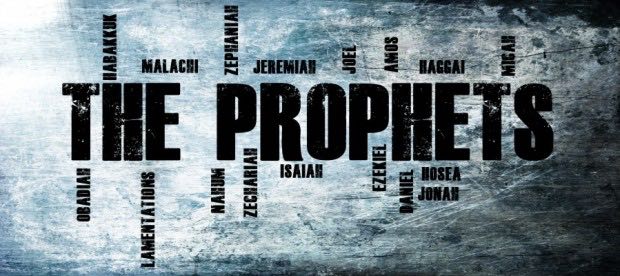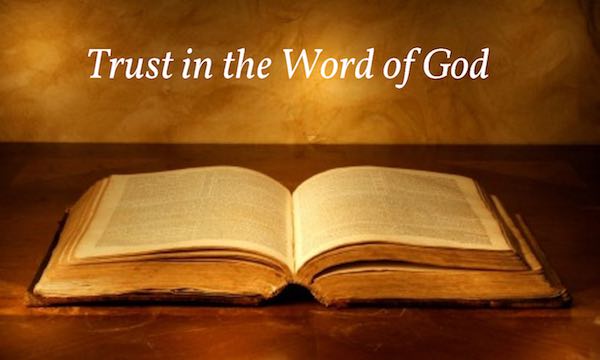We all make decisions everyday and, if we believe in God, many of us pray about the decisions that we need to make. On Sunday of this past week I was praying and asking God to clearly direct me regarding the weekly articles that I write along with the videos that I make for my website. I was feeling the pressure of producing these weekly teachings and was asking God if this is really something that I should continue to dedicate my time and energy to.
Does God Hear Our Prayers?
When I pray I sometimes wonder if God really hears me. This week, however, I was reminded that God does hear my prayers and He also answers. I had prayed specifically throughout the day on Sunday for God to give me wisdom regarding whether or not to continue investing in these weekly Torah Portion teachings. At about 6pm in the evening I went out to run a few errands and I bumped into my friend Olafur from Iceland who often visits Jerusalem. After greeting each other he told me how much he appreciates my weekly teachings on my website and encouraged me to keep up the good work. We must have talked about this subject for about ten minutes as he also had a couple of suggestions for improvement. God had clearly answered my prayer.
Living a life of faith in God is filled with challenges. When we pray we want to know that God hears us and that He will answer us. The uncertainties of life frequently bring us to our knees. We all seek for the certainty of knowing God and hearing His voice. Sometimes God answers our prayers quickly and precisely, as He did for me this past week, but this is not always the case. At other times it seems like God is a million miles away and that He doesn’t even know our names. As we study this week’s Torah Portion we will discover afresh what it means to seek and trust God in relation to His prophetic Word.
Watch a video overview of this week’s Torah Portion!
Be’har – On the Mountain
This week’s Torah Portion is called “Be’Har,” which means “On The Mountain.” While Moses was with the LORD on Mt. Sinai, God instructed Moses regarding the Land of Israel, which the children of Israel were to possess:
The land, moreover, shall not be sold permanently, for the land is Mine; for you are but aliens and sojourners with Me. Thus for every piece of your property, you are to provide for the redemption of the land. – Lev. 25:23-24
The Land of Israel is unique in the earth. All the world belongs to Creator God, however, He specifically chose the Land of Israel as His own unique possession. As we read in this week’s Torah Portion, the Land belongs to the LORD; “כי לי הארץ” – “ki li ha’aretz” – “for the land is Mine.”
The Land of Israel
The LORD invited the Israelites to dwell with Him in the land which He had chosen for Himself. God said that the Israelites are “גרים” – “ge’rim,” which literally means “foreigners” or “aliens.” The Israelites are considered as guests of the LORD in His land. They are also called “תושבים” – “toshavim,” which means one who “inhabits,” “dwells,” or “sojourns” in the land. The Israelites are foreigners who dwell in the land and sojourn with the LORD. It is His land and the Israelites have the right to live in it according to the Landowner’s rules.
The acquisition of the Land of Israel by the Israelites was a promise of God which was first given to Abraham:
I will give to you and to your descendants after you, the land of your sojournings, all the land of Canaan, for an everlasting possession; and I will be their God. – Gen. 17:8
The LORD promised to give the land of Canaan to the descendants of Abraham as an “everlasting possession” – “לאחוזת עולם” -“le’achuzat olam.” It was a real estate deal that was sealed by the covenant of God (Gen. 17:9). The Land of Israel will continually be a possession of the Israelites until God Himself comes to reign as King on this earth (Zechariah 14:9-11).

Redemption of the Land
The LORD specifically commanded that the land was never to be sold permanently and that redemption be provided for the land: “you are to provide for the redemption of the land” (Lev. 25:24). The word for “redemption” in Hebrew is “גאולה” – “ge’u’la.” The land of Canaan as a whole was to be divided up among the twelve tribes of Israel as a possession for each tribe and family. The land belongs to the LORD and the Israelites are to sojourn with the LORD in the land. The land was not to be permanently sold to others, hence redemption must always be a ready provision. What is the purpose for redeeming the land?
There are a few different reasons given in Leviticus 25 in connection to the redemption of the land; for example, providing for an Israelite who becomes too poor to maintain his land and is forced to sell it to another as well as the law of the year of Jubilee where all lands are returned to their original owner. In essence, the Israelites were to be content with their inheritance and treat one another with respect, remembering that the land ultimately belongs to the LORD.
Why did God command redemption for the land?
Beyond these practical reasons given for the redemption of the Land, we find a more significant reason in the Haftara, the reading from the prophets. This week’s reading from the prophets is found in Jeremiah 32:6-27.
The Prophet Jeremiah
Jeremiah was a priest of God who was from the town of Anatot in the territory of Benjamin (Jer. 1:1). Jeremiah was also called to be a prophet of God (Jer. 1:4-10). Jeremiah suffered greatly as a prophet and wept much for his people and for the city of Jerusalem, the city of God.
The context of Jeremiah chapter 32 is clearly laid out for us in the first few verses. At that time, Zedekiah was the king of Judah and the Babylonians were besieging the city of Jerusalem. Jeremiah was put in confinement because he prophesied that the city would be conquered by the Babylonians and that Zedekiah himself would be captured and taken to Babylon (Jer. 32:1-5). Zedekiah did not approve of Jeremiah’s prophetic word. As a result of Jeremiah’s faithfulness to God and declaring what God had revealed to him, he was arrested and placed in confinement in the court of the guard.
Revelation from God
It was while Jeremiah was in confinement in a city that was being laid siege by the Babylonians that God revealed His word to Jeremiah once again:
And Jeremiah said, “The word of the LORD came to me, saying, ‘Behold, Hanamel the son of Shallum your uncle is coming to you, saying, “Buy for yourself my field which is at Anatot, for you have the right of redemption to buy it.”’ Then Hanamel my uncle’s son came to me in the court of the guard according to the word of the LORD and said to me, ‘Buy my field, please, that is at Anatot, which is in the land of Benjamin; for you have the right of possession and the redemption is yours; buy it for yourself.’ Then I knew that this was the word of the LORD. – Jer. 32:6-8
God had clearly spoken to Jeremiah and the word of God was fulfilled. Jeremiah knew without a shadow of a doubt that God Himself had revealed this word to him as every detail came true.
It must have been reassuring for Jeremiah to have received this prophetic word from the LORD that was fulfilled almost immediately. Jeremiah was in confinement for being obedient to the word of God and he must have wondered where God was in the midst of it all. Had God forgotten Jeremiah? Did Jeremiah really hear from God? Was God actually going to fulfill the word which Jeremiah had spoken to the people and the king?

The Calling of a Prophet
When God first called Jeremiah as a prophet, God told Jeremiah that he would speak the words that God commanded him (Jer. 1:7). God then gave Jeremiah this promise:
“Do not be afraid of them, for I am with you to deliver you,” declares the LORD. – Jer. 1:8
God never promised Jeremiah health, wealth, or a “stress-free” life. God promised something greater, the promise of His presence and His power to deliver him. We see this lived out in Jeremiah’s life as he was shut away in confinement for speaking God’s Word, however, God came to him, spoke to him afresh, and reminded Jeremiah that he was not forgotten. God was with him, even in confinement. Deliverance also came, but not exactly when Jeremiah expected it.
Prophetic Redemption
A prophetic word from God while in prison is good news, however, the reality of the news that Jeremiah received while in confinement left something to be desired. God told Jeremiah that his cousin, Hanamel, was going to come to him and offer him the right of redemption of the land in Anatot in the territory of Benjamin and that Jeremiah was to buy it. Everything came about just as the LORD had instructed Jeremiah and Jeremiah knew that it was a true word from the LORD.
Jeremiah bought the land from his cousin Hanamel and redeemed the land of his family for 17 pieces of silver. This purchase of land was a redemptive purchase that was signed, sealed, and witnessed by his fellow Jews, who were also in the court of the guard. We then read these words from the prophet Jeremiah:
And I commanded Baruch in their presence, saying, ‘Thus says the LORD of hosts, the God of Israel, “Take these deeds, this sealed deed of purchase and this open deed, and put them in an earthenware jar, that they may last a long time.” For thus says the LORD of hosts, the God of Israel, “Houses and fields and vineyards will again be bought in this land.”’ – Jeremiah 32:13-15
Jeremiah’s redemptive act of buying the land signified a greater prophetic redemption, that the land would be redeemed again. God had destined the people for captivity and the land to be desolate for 70 years (Jer. 25:11) but this was not the end of God’s covenant with the land and people of Israel.
Despite the crystal clear word from God, which was confirmed through the coming of Hanamel, Jeremiah had a natural struggle to understand exactly what God was doing and why God would command Jeremiah to buy a plot of land that was destined for destruction and desolation. Yes, God had told him that there was still a future for the land and people of Judah, however, outside of God’s promise everything seemed contrary to God’s prophetic word.
The Reality of the Prophecy
We already know that Jeremiah was in confinement in Jerusalem and that the city of Jerusalem was under siege by the Babylonians (Jer. 32:1-6). God had told Jeremiah that the Babylonians would succeed in their campaign against Jerusalem (Jer. 32:3). Beyond the certain destruction of Judah and Jerusalem there was an earlier prophecy from the LORD regarding the utter desolation of the people and land of the city of Anatot, Jeremiah’s hometown:
Therefore thus says the LORD concerning the men of Anatot, who seek your life, saying, “Do not prophesy in the name of the LORD, so that you will not die at our hand”; therefore, thus says the LORD of hosts, “Behold, I am about to punish them! The young men will die by the sword, their sons and daughters will die by famine; and a remnant will not be left to them, for I will bring disaster on the men of Anatot—the year of their punishment.” – Jer. 11:21-23
Jeremiah’s own kinsmen were against him as he prophesied in the name of the LORD. As a result, the LORD promised that no remnant would be left in Anatot and that disaster would be their punishment. Anatot, Jeremiah’s hometown, was to be left utterly desolate. Anatot is the location of the field which Jeremiah purchased from his cousin Hanamel.
Jeremiah’s Struggle
Knowing the reality of the judgement of God on the land, especially his hometown of Anatot, Jeremiah struggled to understand why God would command him to buy a piece of worthless property. Jeremiah knew what God had told him:“Houses and fields and vineyards will again be bought in this land” (Jer. 32:15), however, Jeremiah struggled with the reality around him.
Immediately following the purchase of the field in Anatot, Jeremiah prayed to God:
After I had given the deed of purchase to Baruch the son of Neriah, then I prayed to the LORD, saying, ‘Ah LORD God! Behold, You have made the heavens and the earth by Your great power and by Your outstretched arm! Nothing is too difficult for You,… – Jer. 32:16-17
Jeremiah began by exalting the LORD for who He is and recalled God’s great power. Jeremiah continued to recount the strong arm of God in redeeming Israel from the land of Egypt by signs and wonders.
Jeremiah seemed to be in a place of amazing faith and fortitude as he sat in confinement in a city that he knew would certainly be destroyed, however, the end of Jeremiah’s prayer reveals exactly what he was thinking:
Behold, the siege ramps have reached the city to take it; and the city is given into the hand of the Chaldeans who fight against it, because of the sword, the famine and the pestilence; and what You have spoken has come to pass; and behold, You see it. You have said to me, O LORD God, “Buy for yourself the field with money and call in witnesses”—although the city is given into the hand of the Chaldeans. – Jer. 32:24-25
This is a picture of a perfectly human man of God. Jeremiah knew exactly the plans of God to punish and judge the people of Judah for their disobedience to Him and he also knew God’s plans to restore the people to the land after 70 years (Jer. 25:11). In the midst of all of this chaos and divine revelation Jeremiah struggled to make sense of it all.
Trusting in the Prophetic Word of God
I believe that this account of Jeremiah redeeming the field in Anatot is here for us to remember that God is faithful to His Word. It is easy for us to read this account and to wonder how Jeremiah could have questioned God when God had so clearly revealed His Word to him again and again. However, Jeremiah’s struggle reminds us all that the pain and misery in our lives as well as the opposition around us seek to distract us and steal away God’s promises. We must learn well this lesson from the life of Jeremiah that God is always faithful to His Word, especially when everything around us seems hopeless.

Jeremiah knew God is real and proclaimed who God is while recounting what He had done in the past. Jeremiah knew that God was able to do anything and that there is nothing that He can’t do. At the same time, Jeremiah was honest with God and poured out his heart to Him. Jeremiah reminded God of the situation of the Chaldeans who were overcoming the people and the city with sword and famine and he told God, “You see it.” Jeremiah then reminded God that He had commanded him to buy this field with money, in a land conquered by the Chaldeans. Jeremiah was spiritually exhausted and seemed to be asking, “God, what are you doing?”
God’s Response
Immediately following Jeremiah’s prayer is the record of the word of the LORD that came to Jeremiah in reply to his prayer. The LORD began by reaffirming exactly who He is: “Behold, I am the LORD, the God of all flesh; is anything too difficult for Me?” (Jer. 32:27)
The LORD then continued to explain how everything will happen exactly as He has commanded it: the destruction of Judah and the exile of the people to Babylon, followed by the regathering of the people and the rebuilding of the land (Jer. 32:26-44). The LORD confirmed to Jeremiah that his redemption of the field at Anatot was not in vain:
For thus says the LORD, ‘Just as I brought all this great disaster on this people, so I am going to bring on them all the good that I am promising them. Fields will be bought in this land of which you say, “It is a desolation, without man or beast; it is given into the hand of the Chaldeans.” – Jer. 32:42-43
What is impossible with man is possible with God. The LORD had proclaimed exactly how the end result would be and Jeremiah needed to trust Him.
Jeremiah’s Cousin – “Hanam’el”
As we read earlier, Jeremiah bought the field from his cousin, Hanamel. Hanamel is an unusual name and is only found four times in the Bible (all in Jeremiah 32). It is possibly a misspelling of the name “חננאל” – “Hananel” which means “blessing of God” or “pardon of God.” The name “חננאל” – “Hananel” also appears four times in the Bible (Jer. 31:38. Zech. 14:10. Neh. 3:1. 12:39) and in each of these appearances it is used as a name of one of the towers of the city of Jerusalem. The “tower of Hananel” is always spoken of in connection to the rebuilding and restoring of Jerusalem.
Since the difference between “Hanamel” and “Hananel” is only one letter, it is possible that it is a misspelling, however, it is odd that it would be misspelled four times in the same chapter. Also, the difference between the letters “m” and “n” are the Hebrew letters “מ” and “נ” (“mem” and “nun”), which are not similar in script. There would be no reason to confuse these two letters. Another possibility is a literal derivation of the name “Hanamel” – “חנמאל,” which means, “God of vanity” or “God of nothing.”
Hanam’el – “God of Vanity”
I believe that It was no coincidence that someone with a name which mocks God, Hanam’el – “God of vanity,” was the one to offer Jeremiah the opportunity to redeem the land. Everyone in Anatot would be taken away. No remnant was to be left in Anatot (Jer. 11:23). It was a place that was left desolate and those who were taken captive could potentially believe that God was powerless to defend them. Without faith, God had become to them a “God of nothing,” a “God of vanity.”

The Great & Mighty God!
This is why God had Jeremiah buy and redeem the land when all was forsaken. Jeremiah was demonstrating that God is alive, God sees this situation, God can do anything, and God will one day bring back the captives to the land of Israel and to the land of Anatot. God is the Redeemer and He will do it. God commanded Jeremiah to perform a redemptive act in order to illustrate that the LORD of Israel is not Hanam’el – “The God of nothing,” but rather that He is the “Great and Mighty God” as Jeremiah proclaimed in his prayer (Jer. 32:18).
The Land of Israel was a prophetic sign to Jeremiah and to the people of Judah in his day and it is still a prophetic sign to us today. Just as God has been faithful to fulfill every single promise that He made to Israel throughout history, so He will be faithful until the end. We cannot depend on our feelings or situations to dictate our faith. We need to be honest with God and pour out our hearts to Him at every turn, however in the end, we must proclaim who God is and hold firmly to His Prophetic Word!
Shabbat Shalom!
If you enjoyed reading this article, share it today with friends! We also invite you to sign up for our weekly Torah Portion commentary on the sidebar to the right.
Help keep our weekly commentaries free and available to all. Click here to donate today:
Torah Portion: Lev. 25:1 – Lev. 26:2
Hafatara: Jeremiah 32:6-27
Return to Torah Portion Homepage
Copyright Jewels of Judaism. All rights reserved 2016



Thank you for sharing your commentary. It spoke so loudly to my heart…which was in desperate need to hear such reassuring words.
Bless you Daniel in your faithfulness to God’s Word.
Thank you Melissa!
Daniel
Daniel~
I want to apologize for not posting a comment before today. I have been receiving your weekly ‘Jewels of Judaism’, for quite some time now ,and have been blessed by each one. Truly Blessed ! Thank you , sincerely, for investing your time and thought into each week’s Torah portion. It’s obvious you pour your heart into each one. May YAH Bless you abundantly !!!
Thank you Bonnie! It is good to hear.
Shabbat Shalom.
Daniel
I was tearing while reading this article. Because this is the situation that I’m facing. I am struggling whether I should give up asking for ‘my heart’s desire’ or continue to pray about it even though I can’t see things are going in the way I want. But God keeps encouraging me to ask for it. And I think this article is one of the encouragements.
And thanks for sharing your struggle with us. I’ve asked God for the same question for you. Then I saw why God called you to do this. I think He is building you up and then making you a blessing to more people. I’ve been praying for you that your relationship with Yeshua will be deepened through your regular writings. Your articles will be “Deep calls unto deep” (Psalms 42:7) and God will speak into people’s hearts through your writings and teachings. It’s like a tree, its roots have to go deeper into the soil so that later on you will see beautiful fruit. I’m sure that God hears my prayer, in fact, I believe that this prayer is from Him. So, my dear friend, please keep going and you will see the fruit!
Nancy,
Thank you for your encouraging words and prayers. It is good to know that friends like you are praying for me in this way.
God bless you and Shabbat Shalom!
Daniel